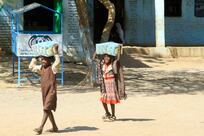Iraqi forces and Kurdish peshmerga fighters agreed on Friday to stop fighting in northern Iraq, the US-led coalition against ISIL said.
A spokesman for the coalition in Baghdad said the ceasefire agreement covered all fronts.
Iraqi government forces and militias of the Iran-backed Popular Mobilisation Units launched a surprise offensive on Kurdish-held territory on October 16 in retaliation for a September 25 referendum on independence organised by the Kurdistan Regional Government (KRG) in northern Iraq.
The offensive aims to capture so-called disputed territories, claimed by both the KRG and the Iraqi central government, as well as border crossings and key oil facilities.
The oil-rich city of Kirkuk fell to Iraqi forces without much resistance on October 16 but the Kurdish peshmerga began to fight back forcefully as they withdrew closer to core KRG territory. The most violent clashes have been in the north-western corner of Iraq where the peshmerga are defending land crossings to Turkey and Syria and an oil hub that controls KRG crude exports.
The ceasefire announcement came hours after Iraqi forces issued an ultimatum for Kurdish fighters to hand over the Fishkhabur border post, according to a government source. But the Kurds gave no indication they were willing to abandon the crucial oil export route, where rival pipelines belonging to both sides cross into Turkey.
Baghdad is currently engaged on two separate fronts: pushing a final offensive to eradicate the ISIL along the western border with Syria, while looking to snatch back disputed territory from the Kurds in the north. Iraqi forces mounted a new assault on Kurdish fighters in the strategic Zummar area of Nineveh province on Thursday, triggering heavy artillery exchanges.
There had been fears the bitter dispute between the Baghdad government and Iraqi Kurdish leaders would hamper the battle against ISIL. But buoyed by a string of recent military successes, Iraqi prime minister Haider Al Abadi is pressing ahead with the dual offensives.
________________________
Read more:
Iraq forces launch 'last big fight' against ISIL
The Iranians should not think they can meddle in the region without consequences
ISIL and the numbers game: what exactly is the size of its army?
__________________________
As the latest push against the Kurds began on Thursday, Mr Al Abadi also announced the start of an offensive to retake the "last den" of ISIL fighters in Iraq around the town of Al Qaim in the Euphrates valley on the border with Syria.
An Iraqi general said that troops backed up by local Sunni militiamen bombarded ISIL with missiles and mortars south of the town on Friday as they tried to press early gains.
Iraqi forces backed by air strikes from the US-led coalition have recaptured 95 per cent of the territory ISIL seized in the country in 2014, dismantling their self-styled caliphate.
Al Qaim has been renowned as a hotbed of extremist insurgency ever since the 2003 US-led invasion of Iraq. Coalition commanders have dubbed the latest operation "the last big fight" in the campaign against ISIL.
The extremist militants are also battling for survival in adjoining territory they hold in Syria, where competing offensives backed by Russia and the US are looking to drive them back.
The US, which has armed and trained both Iraqi and Kurdish forces, has tried to calm tensions between the erstwhile allies in the fight against ISIL and refocus attention on the militants.
The UN security council on Thursday urged Iraq's government and Kurdish leaders to set a timetable for talks on ending their conflict.





